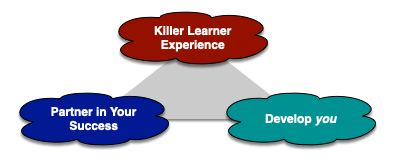I attended the CLO Symposium with my ITA colleagues Jay Cross and Jane Hart. It was an interesting event, with a theme of “Game-Changing Learning: Development for the New Normal“, held at a classy venue on the beach, and was well-organized. (You can see Jay’s writeup here.) And the keynotes that I saw were in synch: Stephen Covey talked about the need for trust and Jon Katzenbach on how to build culture were both excellent, as was Dan Pontefract’s story on making collaboration intrinsic to Telus. At a lower level, however, the conference felt mired in the past.
Jay, Jane, and I ran a unpanel where we took questions from the audience and took turns answering it. Some folks even had trouble with the format, apparently! We got questions about how the role of the learning unit changes, about myths and new tools, and about measurement. Our riff inspired some subsequent inquiries if we could assist. Well, but of course!
A lot of the other sessions also seemed to deal with measurement. A special lunch was held specifically around creating a standard set of measurements: effectiveness, efficiency, and business impact. While the latter is business specific, the other two could be handled. Efficiency tends to mean things like amount per hour of training, etc. Effectiveness was less clear, but I’m afraid we’d see pre-post test messages instead of number of people completing the competency test (happy to be wrong). My problem here is that this stuff shouldn’t be a topic in 2011, it should be already well-practiced and in the repertoire. We should be thinking about how to start tracking meaningful activity in social networks, the value of performance support and more, not old stuff about courses. And, how to tie it back to important deltas in organizational performance.
As for addressing the social and informal metrics, while I addressed this a bit earlier, let me go a bit further. If you are putting in performance support (e.g. a portal, but *ahem*, well-designed) or social network, you should be asking yourself what it should be achieving. Is it closing more sales? Generating higher revenue per sale? How about less time spent on customer calls? If you put in an HR portal, you should expect less calls to HR. If you put in a social network among sales folks, you might expect a higher percentage of closing. Figure out what change this should affect, and then find a way to measure it. Which should be the indicator that you have a problem in the first case!
Which is not to say there weren’t good topics on tap too: leadership development for agility, bridging the gap between IT and the learning unit, informal learning, etc. But when other topics are ‘how to talk to executives’, in- or out-sourcing talent, and on-demand training, it’s clear we’re not where we can, and should, be.
“The future is already here, it’s just not very evenly distributed”, as William Gibson has said, but I guess my concern is with some of what is considered game-changing in an era where the new normal is continual innovation and perpetual beta. Things are moving too fast not to already have mastered the basics of measurement, and be thinking about adapting. The ability to talk ‘business’ should be a pre-requisite for the job, and the strategic issues need to be culture and collaboration. We’re getting there, but then patience has never been one of my strong suits ;).
 An absolutely killer learning experience
An absolutely killer learning experience